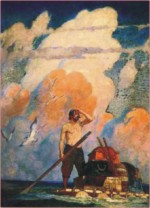| Classic Corner
Robinson Crusoe
By Daniel Defoe
 Robinson Crusoe is a novel by Daniel Defoe, first published in 1719 and sometimes regarded as the first novel in English. The book is a fictional autobiography of the title character, an English castaway who spends 28 years on a remote island, encountering savages, captives, and mutineers before being rescued. This device, presenting an account of supposedly factual events, is known as a "false document", and gives a realistic frame story. The story was probably influenced by the real-life events of Alexander Selkirk, a Scottish castaway marooned on a Pacific island for four years. Robinson Crusoe is a novel by Daniel Defoe, first published in 1719 and sometimes regarded as the first novel in English. The book is a fictional autobiography of the title character, an English castaway who spends 28 years on a remote island, encountering savages, captives, and mutineers before being rescued. This device, presenting an account of supposedly factual events, is known as a "false document", and gives a realistic frame story. The story was probably influenced by the real-life events of Alexander Selkirk, a Scottish castaway marooned on a Pacific island for four years.
The full title of the novel is The Life and Strange Surprising Adventures of Robinson Crusoe of York, Mariner: who lived Eight and Twenty Years, all alone in an uninhabited Island on the coast of America, near the Mouth of the Great River of Oroonoque; Having been cast on Shore by Shipwreck, wherein all the Men perished but himself. With An Account how he was at last as strangely deliver'd by Pirates.
Summary
Crusoe leaves England on a sea voyage in September, 1651 against the wishes of his parents. The ship is taken over by Salè pirates and Crusoe becomes the slave of a Moor. He manages to escape with a boat and is befriended by the Captain of a Portuguese ship off the western coast of Africa. The ship is en route to Brazil. There with the help of the Captain, Crusoe becomes owner of a plantation.
He joins an expedition to bring slaves from Africa, but he is shipwrecked in a storm about forty miles out to sea on an island near the mouth of the Orinoco river on September 30, 1659. His companions all die; he manages to fetch arms, tools and other supplies from the ship before it breaks apart and sinks. He proceeds to build a fenced-in habitation and cave, keeps a calendar by making marks in a wooden cross he builds. He hunts, grows corn, learns to make pottery, raises goats, etc. He reads the bible and suddenly becomes religious, thanking God for his fate in which nothing is missing but society.
 He discovers native cannibals occasionally visit the island to kill and eat prisoners. At first he plans to kill the savages for their abomination, but then he realizes that he has no right to do so as the cannibals have not attacked him and do not knowingly commit a crime. He dreams of capturing one or two servants by freeing some prisoners, and indeed, when a prisoner manages to escape, Crusoe helps him, naming his new companion "Friday" after the day of the week he appeared, and teaches him English and converts him to Christianity. He discovers native cannibals occasionally visit the island to kill and eat prisoners. At first he plans to kill the savages for their abomination, but then he realizes that he has no right to do so as the cannibals have not attacked him and do not knowingly commit a crime. He dreams of capturing one or two servants by freeing some prisoners, and indeed, when a prisoner manages to escape, Crusoe helps him, naming his new companion "Friday" after the day of the week he appeared, and teaches him English and converts him to Christianity.
After another party of natives arrive to partake in a grisly feast, Crusoe and Friday manage to kill most of the natives and save two of the prisoners. One is Friday's father and the other is a Spaniard, who informs Crusoe that there are other Spaniards shipwrecked on the mainland. A plan is devised where the Spaniard would return with Friday's father to the mainland and bring back the others, build a ship, and sail to a Spanish port.
Before the Spaniards return, an English ship appears; mutineers have taken control of the ship and intend to maroon their former captain on the island. The captain and Crusoe manage to retake the ship. They leave for England, leaving behind three of the mutineers to fend for themselves and inform the Spaniards what happened. Crusoe leaves the island on December 19, 1686. He travels to Portugal to find his old friend, the Captain, who informs him that his Brazilian plantation was well cared for and he has become wealthy. From Portugal, he travels overland to England, to avoid mishaps at sea, via Spain and France; during winter in the Pyrenees, he and his companions have to fend off an attack by vicious wolves. Back in England, he decides to sell his plantation, as returning to Brazil would entail converting to Catholicism. Later in life, after marrying, having three children and becoming widowed, he returns to his island for a last time. The book ends with a hint about a sequel that would detail his return to the island, which had been discovered.
Copyright
(R) thedailystar.net 2007 |
